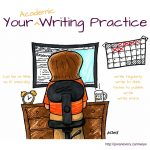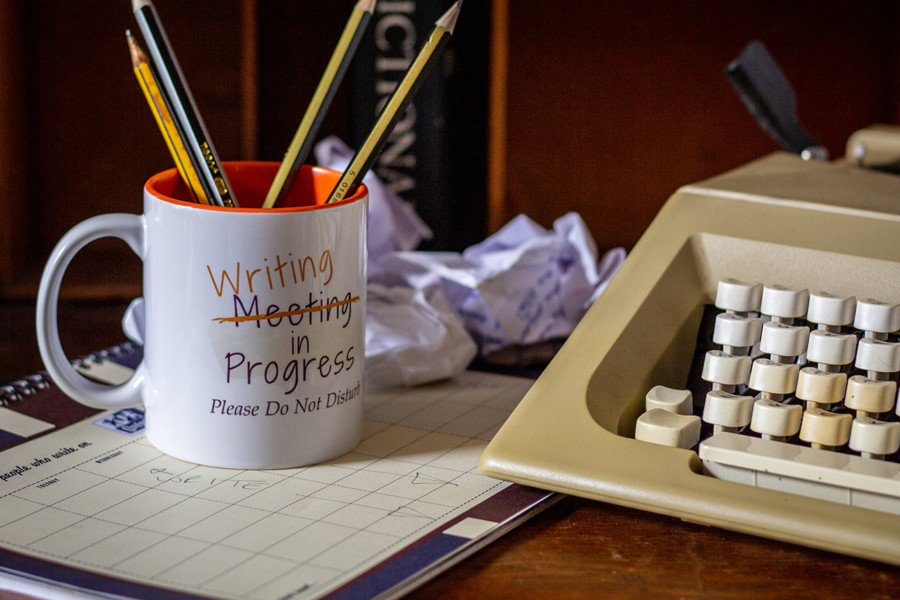You don’t have to write in obscurity waiting to be discovered. Whether you write on a blog or you create multiple documents on your own computer, you can create an audience for your writing. In this post, I offer several options for creating conversation on a blog.
Read More »Developing a Practice
 Your academic life is more than a string of articles published, classes taught, and meetings attended. You write because this is how you articulate and develop your ideas. You publish to communicate those ideas to others. Posts in this category help you develop the practices you need to do the work you love well without burning out or compromising your values.
Your academic life is more than a string of articles published, classes taught, and meetings attended. You write because this is how you articulate and develop your ideas. You publish to communicate those ideas to others. Posts in this category help you develop the practices you need to do the work you love well without burning out or compromising your values.
You Need a Writing Practice is a good place to start to investigate the Writing subcategory.
Juggling 101: Elements of a good plan is a good place to start investigating the Planning subcategory.
Making Writing Less Scary: Blogging might help
Developing the habit of writing is probably the best reason for starting a blog. People who blog about their academic work in progress find it very rewarding. You may also discover that there are lots of non-academics who think deeply about similar things. You don’t even have to blog about your research. In this post, I address some of your fears and give you some strategies for keeping the meanies out of the comments.
Read More »Making Writing Less Scary: What to write
Stop worrying about the right way. It is much easier to edit than to write brilliant prose the first time.
This is especially important while you are still developing the habit of writing. But even when that habit is established, writing is a complex activity. The part where you structure your written ideas into an academic article, an academic monograph, a newspaper article, a novel, a report for decision makers, or trade non-fiction book is just that, a part of the process. A lot of writing happens before you get there.
The idea is to get your ideas out of your head and on to paper where you can do things with them. Writing helps you think. In this post, I give you some ideas for how to do that.
Read More »Making writing less scary: Develop a habit
There is no point thinking too much about the publishing part until you have actually written something. Writing is a habit. The more you write the easier it is to write. And the better your writing becomes. Like any habit, you can develop it. In this post, I talk about what developing a writing habit might look like in practical terms.
Read More »Getting comments on your draft
This post inspired by a tweet: Is it cruel for me to ask people to read and comment on a draft article during the summer? — Philippe Lagassé (@pmlagasse) July 25, 2012 My immediate reaction is “Hell No!” but I can see how it might feel cruel. After all summer is the one time of […]
Read More »The goal & what you can do
This post is part of an occasional series about how yoga influences how I work with clients. I don’t expect you to do yoga. You don’t even have to attempt the pose I’m going to talk about. Ever. In your whole life. The point of this series is that yoga has taught me some interesting […]
Read More »Email is not urgent
Jo VanEvery, Academic Career Guide · Email is not urgent Do not start an email with this sentence or any variation on it: “Sorry for the delay in replying” You are busy. Your inbox gets full. Sometimes it takes a while to get back to people. Sometimes you miss something and notice it 2 weeks […]
Read More »Criticism & perfectionism
One of my favorite quotes is by Samuel Silas Curry, a turn of the century speech teacher, “There is nothing so encouraging as good criticism.” He goes on to say that good criticism simply compares the actual with the ideal. Vicky@collegeparentcentral commenting on my post Confidence in the Face of Criticism Thank you for sharing […]
Read More »Confidence in the face of criticism
Jo VanEvery, Academic Career Guide · Confidence in the face of criticism I received a request via Twitter DM. Have u any tips on academic speaking eg @ q & a time @ conferences. How can I gain confidence and speak with conviction in the face of criticism? As it happens I do have thoughts […]
Read More »Just because it doesn’t feel productive…
A couple of my clients are working on writing projects right now. And some weeks, their updates are less than enthusiastic. They are discouraged by their progress.
Here’s a different angle on reading that doesn’t feel like real research.
You might spend a lot of time reading with a particular project in mind only to discover that nothing you read is going to end up in what you are writing.
Although that feels like you wasted several hours reading stuff you didn’t need to read, it was actually time well spent.
Read More »What is “research”?
Jo VanEvery, Academic Career Guide · What is research? In early 2012, Rohan Maitzen published a few very thoughtful posts about: what counts as research the apparent conflict between research and teaching and related issues. One of these, “When is Reading Research?“, really highlights some of the underlying issues. “When we talk about “doing research,” I […]
Read More »Volunteer before you’re drafted
If your level of frustration with your working hours is more about what you are doing in them than how many of them you are working, how do you increase the proportion of your time spent doing things that are meaningful? Try this suggestion from the #femlead Twitter chat. (Which sadly doesn’t happen any more.) […]
Read More »











